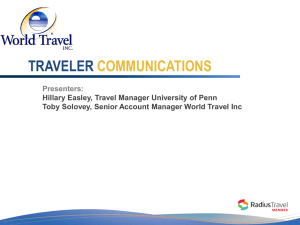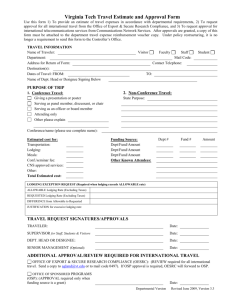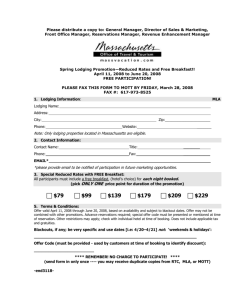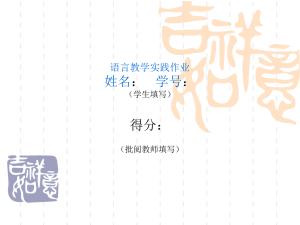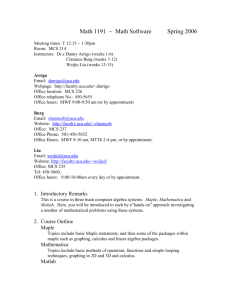TR-1 Instructions (Oct 2015)
advertisement
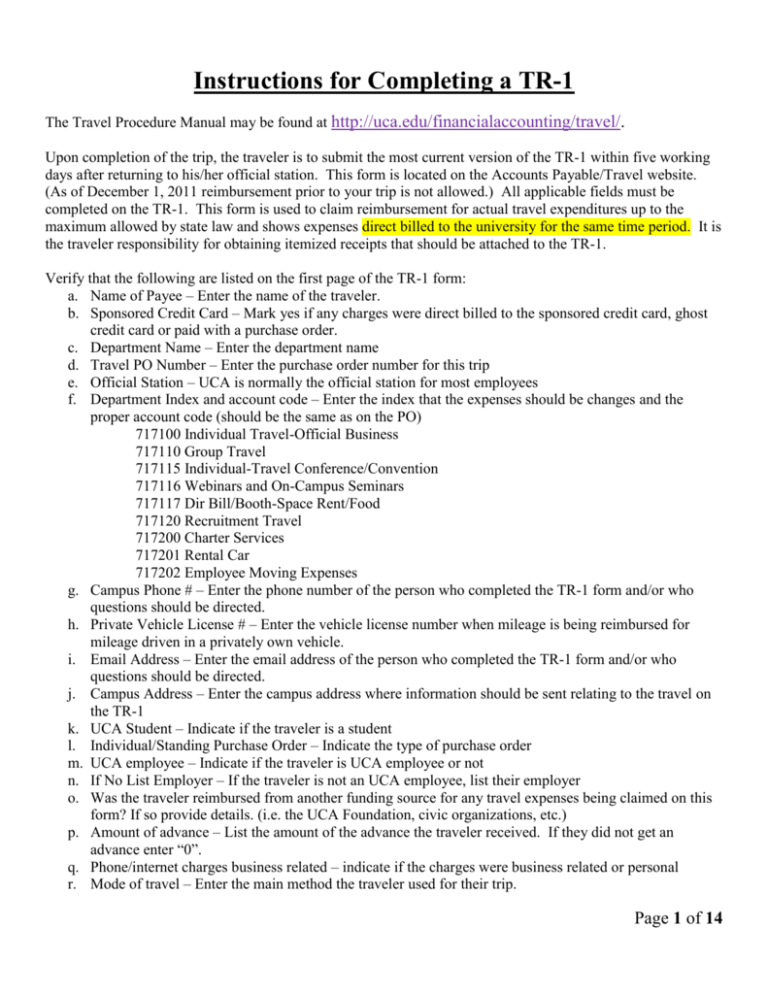
Instructions for Completing a TR-1 The Travel Procedure Manual may be found at http://uca.edu/financialaccounting/travel/. Upon completion of the trip, the traveler is to submit the most current version of the TR-1 within five working days after returning to his/her official station. This form is located on the Accounts Payable/Travel website. (As of December 1, 2011 reimbursement prior to your trip is not allowed.) All applicable fields must be completed on the TR-1. This form is used to claim reimbursement for actual travel expenditures up to the maximum allowed by state law and shows expenses direct billed to the university for the same time period. It is the traveler responsibility for obtaining itemized receipts that should be attached to the TR-1. Verify that the following are listed on the first page of the TR-1 form: a. Name of Payee – Enter the name of the traveler. b. Sponsored Credit Card – Mark yes if any charges were direct billed to the sponsored credit card, ghost credit card or paid with a purchase order. c. Department Name – Enter the department name d. Travel PO Number – Enter the purchase order number for this trip e. Official Station – UCA is normally the official station for most employees f. Department Index and account code – Enter the index that the expenses should be changes and the proper account code (should be the same as on the PO) 717100 Individual Travel-Official Business 717110 Group Travel 717115 Individual-Travel Conference/Convention 717116 Webinars and On-Campus Seminars 717117 Dir Bill/Booth-Space Rent/Food 717120 Recruitment Travel 717200 Charter Services 717201 Rental Car 717202 Employee Moving Expenses g. Campus Phone # – Enter the phone number of the person who completed the TR-1 form and/or who questions should be directed. h. Private Vehicle License # – Enter the vehicle license number when mileage is being reimbursed for mileage driven in a privately own vehicle. i. Email Address – Enter the email address of the person who completed the TR-1 form and/or who questions should be directed. j. Campus Address – Enter the campus address where information should be sent relating to the travel on the TR-1 k. UCA Student – Indicate if the traveler is a student l. Individual/Standing Purchase Order – Indicate the type of purchase order m. UCA employee – Indicate if the traveler is UCA employee or not n. If No List Employer – If the traveler is not an UCA employee, list their employer o. Was the traveler reimbursed from another funding source for any travel expenses being claimed on this form? If so provide details. (i.e. the UCA Foundation, civic organizations, etc.) p. Amount of advance – List the amount of the advance the traveler received. If they did not get an advance enter “0”. q. Phone/internet charges business related – indicate if the charges were business related or personal r. Mode of travel – Enter the main method the traveler used for their trip. Page 1 of 14 s. If you drove mark one: Personal – mark when you drove your personal vehicle on official business only University vehicle – mark when you drove a university own vehicle. For example, a Police car or Admission vehicle or Physical Plant vehicle etc. Rental – Phy Plant – mark when you rented a vehicle through Physical Plant. (Normally leaving from UCA) Please note no justification is needed when a vehicle is rented through Physical Plant and leaving from UCA. Rental website – mark when you rented a vehicle from Enterprise using the link on the Travel website. Other – fill in what was driven. For example an U-Haul truck. t. Were meals provided by the conference? – When the account code on the PO is “717115” for conference this block must be completed. None – Put a “X” in the space when no meals were provided by the conference Some – Put a “X” in the space when only part of the meals were provided at the conference All – Put a “X” in the space when every meal were provided at the conference In addition, the conference agenda needs to be attached to the TR-1. Meals that were provident by the conference can’t be reimbursed unless there is documentation (written Justification) of religious beliefs, health reasons, or conducting official business. u. List passenger/s – List all people who rode in the same personal vehicle, shared lodging, or were a guest of state and expenses are being claimed. v. “Special Lodging Authorization” – This section is used when the lodging expenses exceed the maximum allowed (per diem rate). Reason why less expensive lodging was not selected – include an explanation. o Example #1: stayed at conference hotel. o Example #2: safety and availability o Example #3: networking (must list who you are networking with – alumni or talking with other universities on how they do things, etc.) Per Diem Rate – May be found at http://www.gsa.gov/portal/content/104877 Cost Per Day – List the actual cost of the lodging Numbers of Days – List the number of days the maximum lodging was exceeded Total – The total will automatically calculate. w. Justification for Rental Car –The administrative head or travel administrator shall authorize in writing, the use of rental vehicles only when it is more economical than taxi, airport shuttle, etc. Enterprise or Hertz must be used because of the statewide vehicle rental contracts. Justification for the rental vehicle must be completed to receive reimbursement and must include number calculations of the cost savings. Documentation must be attached to the TR-1 to show where the numbers came from that was used in the calculations of the cost savings x. Comments– Enter any addition information that is relevant to your trip Page 2 of 14 UCA TRAVEL EXPENSE REIMBURSEMENT FORM, TR-1 Marcia Girdler a Name of Payee: b Sponsored Credit Card c Department Name: Financial Accounting d Travel PO Number: e Official Station: UCA f Department Index: h Private Vehicle License # g Campus Phone #: 450-5025 j Campus Address: marciag@uca.edu ib Email Address: No k UCA Student: l Individual: Yes X m UCA Employee: n If No List Employer: No Yes X o Was the traveler reimbursed from another funding source for any travel expenses being claimed on this form? If so provide details. p Amount of the Advance: $268.00 q Are phone/internet charges business related? s Were meals provided by the conference? None r Mode of Travel: Car RentalUniversity Rental Other website vehicle Phy Plant Explain X ht If you drove mark one: Personal u Pam Giblet, Linda Lentz, Michelle Burgin, and Angela Parham h List passenger/s: Yes no 703000 Account Number: No P0099999 717115 n/a McCastlain 019 X Blanket: Yes No X Yes No X Some X All Special Lodging Authorization - (Total room rate - See UCA Travel Regulations) Reason why less expensive lodging was not Conference's hotel v selected: Per Diem Rate Cost Per Day Number of Days $104.00 $125.00 6 XXXXX XXXXX 6 Total $750.00 $0.00 $750.00 YOU MUST PUT THE COST PER DAY AND THE NUMBERS OF DAYS YOU ARE REQUESTING AUTHORIZATION TO RECEIVE FULL REIMBURSEMENT. http://www.gsa.gov/portal/content/104877?utm_source=OGP&utm_medium=print-radio&utm_term=portal/category/21287&utm_campaign=shortcuts Justification for Rental Car w Comments x Revised 10/14/15 Page 3 of 14 Below is an example of page 2 of a TR-1. a. Name of Payee – Make sure the name appears (should flow from the first page of the TR-1). b. Travel PO # – Make sure the purchase order appears (should flow from the first page of the TR-1). c. Date – Make sure that the travel dates listed on the TR-1 form match the travel dates listed on the Purchase Order. If the travel dates do not match, the traveler will have to write a memo correcting the travel dates and have their department head, their area Vice President and the Travel Administrator (currently Marcia Girdler) sign the memo. d. Departure & return time – Be sure that the departure and return times are listed for all applicable days. e. Name of Town Visited – Make sure the name of the town visited matches the name of the town listed on the Purchase Order. If they do not match an explanatory memo must be done to explain the change in the town visited. The memo must be signed by the department head, the vice president of the respective division and Travel Administrator (currently Marcia Girdler). Travel may be conducted by plane, train, bus, taxi, private vehicle/aircraft, rented or state-owned automobile. Whichever method serves the requirements of the state (UCA) most economically and advantageously may be selected. The traveler should also consider costs of their time, safety, parking fees, baggage fees, hotel and meals, in determining the most economical and advantageous method of traveling. Reimbursement for out-ofstate travel will be the lesser of coach/economy class airfare or the established rate of private car mileage, based on the shortest distance. All airline tickets must be direct billed to the university by using a sponsored credit card, a ghost credit card, or a purchase order. The only exception to the rule of having the airline ticket direct billed to the university is if it can be documented that it saves the university money when an individual pays for his/her own airline tickets. For example when you purchase your airfare and lodging together using Travelocity it saves $250.00. The following steps should be followed: Look up the cost of the flight and print it out $350.00 Look up the cost of the hotel and print it out $800.00 for four nights If the cost using Travelocity for booking airfare and lodging is $900.00 you may goes ahead and use Travelocity. When the TR-1 is turned in the documents where the cost of the flight and the cost of lodging were looked up separately must be attached to the TR-1. Split the cost between the flight and lodging by using percent, then apply the percent to the cost of purchasing the flight and lodging together. See below: Separate Cost Percent Flight Lodging Total $ $ $ 350.00 800.00 1,150.00 Cost Together $ 900.00 30% $ 270.00 70% $ 630.00 100% $ 900.00 The percent worksheet should also be attached to the TR-1 On the TR-1 $270.00 should be list as the cost of the flight and $630.00 should be list as the cost of the lodging. The worksheet can be found on the Travel website – called “split air & lodging” o Only the fields in yellow needs to be completed. The others are self-calculating. f. Airline ticket should be coach/economy class airfare and listed on the third page of the TR-1 under “Common Carrier”. Airline tickets should be purchased at least 14 days prior to travel if possible. Airline tickets purchased with less than a 14 day advance shall be explained in writing to the head of the agency (the President) and approved by him/her in writing prior to purchase. The university is not Page 4 of 14 allowed to pay for preferred seating or early-bird check-in. Other form of transportation may be listed on the second page of the TR-1 under “Common Carrier”. For example, train or bus. g. Taxi expense is allowed for business use only. Taxi will not be reimbursed for going out to eat or shopping. Receipts for a taxi are not required to be turned into the Travel Office. UCA does not reimburse tips in addition to a taxi’s rate. Below is an example of the second page of a TR-1. Instruction for “a” through “g” is on the pages above. Instruction for “h” through “r” is on the pages below. UCA TRAVEL EXPENSE REIMBURSEMENT FORM, TR-1 Marcia Girdler Name of Payee: a DATE c DETAILED EXPENDITURES (OTHER THAN MILEAGE) Departure & return times 09/15/13 Dep Ret COMMON CARRIER HOTEL ROOM MEALS TAXI INCIDENTALS** 34.50 30.00 ** St Louis MO 33.00 ** 09/17/13 d 09/21/13 Dep NAME OF TOWN VISITED 5:30 AM St Louis MO 09/16/13 Dep Ret Dep Ret Dep 09/18/13 Ret Dep 09/19/13 Ret Dep 09/20/13 Ret Travel PO Number: TRAVEL BY PRIVATELY OWNED VEHICLE PHONE TOTAL PER DAY FROM 64.50 Conway AR Conway AR 32 RATE PER AMOUNT MILE CLAIMED 11.20 33.00 0.35 0.00 34.50 ** 34.50 0.35 0.00 St Louis MO * 28.75 ** 28.75 0.35 0.00 St Louis MO * 19.75 ** 19.75 0.35 0.00 St Louis MO * 65.55 ** 65.55 0.35 0.00 0.35 11.20 Little Rock 123.00 Airport 70.00 e * f 23.00 104/66 B Conway AR 32 * ** 0.00 0.35 0.00 * ** 0.00 0.35 0.00 0.35 0.00 0.00 0.35 0.00 * h * Per Diem 30.00 ** i j g ** ** j k o 0.00 m n o * ** 0.00 0.35 0.00 * ** 0.00 0.35 0.00 * ** 0.00 0.35 0.00 * ** 0.00 0.35 0.00 * ** 0.00 0.35 0.00 * ** 0.00 0.35 0.00 * ** 0.00 0.35 0.00 l 0.00 0.00 239.05 60.00 70.00 0.00 369.05 **A)Postage B)Parking Fees C)Registration D)Emergency Car Repairs E)Guide Services for the Blind & Wards of State F) Minor Purchases G)Meals for State Guests H)Other (Explain) p 64.00 XXXX SUB-TOT MILEAGE 22.40 RECAPITULATION s Jeremy Bruner Supervisor (for Guest of State the Department Head) Approval MILEAGE DRIVEN 0.35 SUB-TOT EXPENDITURES Approval TO * St Louis MO *Hotel tax rate 16.00% P0099999 St Louis MO 5:00 PM Ret Dep Ret Dep Ret Dep Ret Dep Ret Dep Ret Dep Ret Dep Ret Dep Ret Dep Ret Dep Ret Dep Ret b r EXPENDITURE CLAIMED Marcia Girdler MILEAGE CLAIMED $369.05 $22.40 Signature of Traveler* Project Coodinator AP/Traveler TOTAL CLAIMED $391.45 Travel Office Signature Title Amount Owed Traveler $123.45 *By signing this form you are stating that the figures are accurate and truthful to the best of your knowledge and that actual meal expenses, not per diem, are included on this form up to the maximum allowed. Page 5 of 14 q The State of Arkansas limits the daily maximum for meals and lodging. The state uses the federal-per-diem rate based on the location for in-state, out-of-state, and foreign travel. To determine the daily meal maximum permitted, see the website address at http://www.gsa.gov/portal/content/104877 . Click on the state then find the city of destination to determine the maximum amount of lodging and meals allowed per day for that city. For Alaska, Hawaii, US Territories, and Possessions rates click the Alaska or Hawaii box. For foreign rate click the foreign travel box. If the destination is not listed, the standard maximum meal rate is applicable. If meals are provided by the conference, you can’t be reimbursed for these meals unless there is documentation (written justification) of religious beliefs, health reasons or conduct of official business. See examples below. For our example St. Louis MO was used For Alaska, Hawaii, and US Territories rates For international rates Page 6 of 14 The per diem rates should be visible. Select the correct month/year for the lodging. Lodging Meals Compare the actual amount spent to the maximum allowed and enter the lesser amount. Example #1: The traveler spent $70.00 for meals and the maximum allowed is $54.00, then $54.00 should be enter on the TR-1 for that day. Example #2: The traveler spent $49.00 for meals and the maximum allowed is $54.00, then $49.00 should be enter on the TR-1 for that day. Page 7 of 14 For foreign travel, 10% must be deducted from the price of lodging that is listed on the federal per-diem rate because these rates has incidental built into the amount and the state (UCA) reimbursed for incidentals separately. List below is an example of now to calculate the maximum that can me claimed for foreign lodging. Location Beijing China Type Maximum 10% Maximum you could claim Lodging $258.00 $25.80 $232.20 h. Lodging - Please note the first square on each line of the lodging column is for the lodging itself. The second square, that is tinted gray, is for the total tax charged on the hotel room. An itemized receipt of the lodging with the travel name is required to be turned in with the TR-1 form. Check to see if the lodging amount is within the maximum allowed. If the amount is over complete on the first page of the TR-1 complete the “Special Lodging Authorization” block. If no reason is listed the amount must be marked down to the maximum allowed and the tax prorated. To prorate the tax take the tax amount divide by the hotel amount paid to get a percent. The percent times the maximum allowed for lodging is what the traveler may claim for tax. For example if no reason were listed on the TR-1 $120.64 ($104 + $16.64) would have been the maximum allowed. $20.00 / $125.00 = 16% X $104.00 = $16.64 The process for lodging is the same when the traveler pays with personal funds and gets reimbursed (will be listed on the second page of the TR-1) or when the lodging is directed billed to the university (will be listed on the third page of the TR-1). i. Meals - On the first and last day of travel, the traveler is only allowed to claim up to 75% of the daily maximum amount allowed. On the departure date, the 75% is based on the destination. On the return date, the 75% is based on Conway, which is the official station of the traveler. The traveler’s meal receipts are not required to be submitted to the Travel Office. Please see table below to determine which meals may be claimed on the first and last day of travel. A traveler must leave at or before 6:00 a.m. to claim breakfast. A traveler must leave before 1:00 p.m. to claim lunch. A traveler must return at 11:00 a.m. or after to claim lunch. A traveler must leave before 6:00 p.m. to claim dinner. A traveler must return at or after 6:00 p.m. to claim dinner. Page 8 of 14 To determine the maximum for each meal locate the maximum allowed for your location then find the meals of interest in the domestic travel rates table. Domestic Travel Maximum Allowed 51.00 54.00 59.00 64.00 69.00 74.00 First Day of Travel 38.25 40.50 44.25 48.00 51.75 55.50 8.50 9.00 9.83 10.67 11.50 12.33 Lunch 17.00 18.00 19.67 21.33 23.00 24.67 Dinner 25.50 27.00 29.50 32.00 34.50 37.00 38.25 38.25 38.25 38.25 38.25 38.25 Breakfast Last Day of Travel Note: UCA will NOT reimburse for alcoholic beverages purchased. j. Miscellaneous expenses (incidentals) are allowed with adequate justification when they are necessary in the performance of the official duties. Detailed receipts are required. For example, postage, parking fees, registration fees, emergency car repairs (for UCA own cars only), guide services for the blind & wards of the state, minor purchases, baggage fees, and meals for guest of state. Incidentals need to be listed on the date they occurred with the corresponding alpha letter for notation (See the bottom of page 2 for corresponding letters). If membership dues are associated with a conference registration, they also may be claimed on the TR-1 by attaching a proper receipt, but must be reimbursed under account code 710101; otherwise, dues should be paid on a separate purchase order. The university does not reimburse for personal entertainment (except for student groups), flowers, valet services, laundry (except for official student groups), alcoholic beverages, cleaning or for meal expenses for another state employee. A traveler can only be reimbursed for one personal baggage fee per flight. This doesn’t include baggage for equipment necessary to perform your duties while on your trip. For example, the golf team will need to transport golf clubs in order to play in a golf tournament. k. Only business-related calls and internet charges will be reimbursed. On the first page of the TR-1 form the “Yes” box must be marked to the question “Are phone/internet charges business related?” or a memo must be sent to the Travel Office with the TR-1 form. l. The “Total Per Day” column adds the expenses for that day that are listed to the left of the column. The university will reimburse for official miles driven only. Private vehicle mileage shall be reimbursed and computed, using the shortest distance in miles between the travel site destination and the employee's official station or residence, if leaving directly from the residence, whichever is less. Maximum mileage Page 9 of 14 allowed for private vehicle use will be reimbursed at the current rate designated by the University of Central Arkansas of $.35. Any vicinity mileage claimed should be listed separately and noted as such. If more than one traveler is transported in the same vehicle, only the owner of the vehicle can claim mileage reimbursement. Official mileage will be verified via the Rand McNally website located at http://maps.randmcnally.com/ and must be listed in whole numbers on the TR-1. Click the “Setting” selection and change the default to “shortest” and then hit the update bottom. UCA allows a five mile overage/shortage on all mileage. An example of looking up mileage is listed below Page 10 of 14 Select the “Shortest Distance” Page 11 of 14 28.4 miles is within the 5 miles over/short of the 32 miles claimed on the TR-1 in our example. Miles should be list on the TR-1 as 28 miles, not 28.4 or 29. We use the standard rounding for whole number, .5 will round up and anything less will round down. m. The city or town the traveler is leaving from is listed first. n. The travel site destination is listed second. o. Mileage Driven – Use the Rand McNally website shortest distance to find your mileage. The mileage/directions at the shortest distance should be listed. All other mileage driven should be listed on a separate line and marked as vicinity. p. The current rate is $.35 per mile. q. Automatic calculation - The miles being claimed times the current rate equals the amount claimed. r. Make sure the traveler has signed the form. The TR-1 cannot be processed for reimbursement until it is signed. s. The TR-1 must be signed by his/her supervisor because the supervisor will have a better awareness of actual dates traveled and trips cancelled. The supervisor should check for excessive expenses being claimed including claiming per diem rate, personal use, and other sources of funding. The TR-1 cannot be processed for reimbursement until it is signed. Congratulations you just completed the first two pages of the TR-1. Only one more to go. Page 12 of 14 All transactions related to the trip that were direct billed to the university on another Purchase Order or on the Ghost Card or on the Department Sponsored Card need to be listed on the third page of the TR-1. The traveler’s name, the PO number, the date/s, and the location will automatically populate. The regulations for hotel room, common carrier, and incidentals still apply even though these items were direct billed. a. PO or Credit Card Type – If the expenses was direct billed to the university state how by listing “PO” or “Ghost CC” for ghost credit card or “Spon CC” for sponsored credit card. b. Hotel room – If the traveler paid for the hotel room the expense they goes on page 2 of the TR-1, but if the hotel room was direct billed to the university and paid with a PO, ghost credit card or sponsored credit card then the hotel room expense goes on page 3. c. Common carrier – Airline tickets should always be direct billed thus should always be put on the page 3 for UCA employees. If a guest of state pays for their own airline ticket then it will go on page 2. d. The State of Arkansas has a contract with Hertz and Enterprise, therefore, all rentals should go through them. The Travel website has a link to Enterprise that should always be used when renting a car except when leaving from UCA. (Physical Plant handles all rentals leaving from UCA, see their website for more information) We currently are working on getting Hertz setup similar to Enterprise. e. Incidentals – If the traveler paid for the incidental expense, the expense go on page 2 of the TR-1, but if the incidentals were direct billed to the university and paid with a PO, ghost credit card or sponsored credit card then the expense goes on page 3. f. Other – List here all other expenses that were direct billed that didn’t fit into one of the other categories. g. Registration paid that was direct billed to the university on a PO, ghost credit card, or sponsored credit card should be listed on page 3. (If the traveler paid for the registration with personal funds, it goes on page2) h. Total direct billed per day will automatically calculate (it is the total of columns “a” thru “f”) i. Total from TR-1 will automatically populate from page 2 j. Grand total daily expenses will automatically calculate (it is the total of columns “g” and “h”) Page 13 of 14 UCA's Travel Expense Reconciliation Form Expenses on the Ghost Credit Card, Sponsored Credit Card, or on a PO Name of Payee: Marcia Girdler DATE NAME OF TOWN VISITED 09/15/13 09/16/13 09/17/13 09/18/13 09/19/13 09/20/13 09/21/13 01/00/00 01/00/00 01/00/00 01/00/00 01/00/00 01/00/00 01/00/00 01/00/00 Travel PO Number: PO # or CREDIT CARD TYPE HOTEL ROOM COMMON CARRIER RENTAL CAR INCIDENTALS** 125.00 St Louis MO Ghost C/C * 20.00 OTHER P0099999 REGISTRATION FEE (C) TOTAL DIRECT BILLED PER DAY TOTAL FROM TR-1 GRAND TOTAL DAILY EXPENSES 300.00 493.00 ** 938.00 75.70 1013.70 ** 145.00 33.00 178.00 ** 145.00 34.50 179.50 ** 145.00 28.75 173.75 ** 145.00 19.75 164.75 ** 145.00 65.55 210.55 ** 0.00 134.20 134.20 0.00 0.00 0.00 0.00 0.00 C 125.00 St Louis MO Ghost C/C * 20.00 125.00 St Louis MO Ghost C/C * St Louis MO Ghost C/C * 20.00 125.00 20.00 125.00 St Louis MO Ghost C/C * 20.00 125.00 St Louis MO Ghost C/C * St Louis MO * 0 a * 20.00 b c d e ** ** e f e g h i j 0.00 0 * 0 * ** 0.00 0.00 0.00 0 * ** 0.00 0.00 0.00 0 * ** 0.00 0.00 0.00 0 * ** 0.00 0.00 0.00 0 * ** 0.00 0.00 0.00 0 * ** SUB-TOT EXPENDITURES XXXX 870.00 493.00 0.00 300.00 0.00 0.00 **A)Postage B)Parking Fees C)Registration D)Emergency Car Repairs E)Guide Services for the Blind & Wards of State F) Minor Purchases G)Meals for State Guests H)Other (Explain) *Hotel tax rate 16% 0.00 1663.00 0.00 391.45 0.00 2054.45 If there is more than the greater of a 5% or $25.00 difference between the dollar amounts claimed on the TR-1 and the approved Travel Purchase Order, a change order to increase the Travel Purchase Order must be processed in Banner before the reimbursement can be processed. General information If UCA is reimbursing the traveler for additional travel expenses above the amount of his/her advance, for employees the funds will be direct deposited into the traveler’s bank account. An email will be sent to inform the traveler that a direct deposit was processed. It will include the date and the amount. If the traveler's advance exceeds the reimbursable expenses, the Travel Office will e-mail him/her that the travel is ready to settle and the date by which it must be settled. Travel advances must be repaid within 23 days of the traveler returning to his/her official station. Failure to settle travel with or without advances by the due date may result in suspension of future travel privileges. (Note: if the traveler is not an employee they may have their reimbursement direct deposited or may receive a check.) Page 14 of 14
